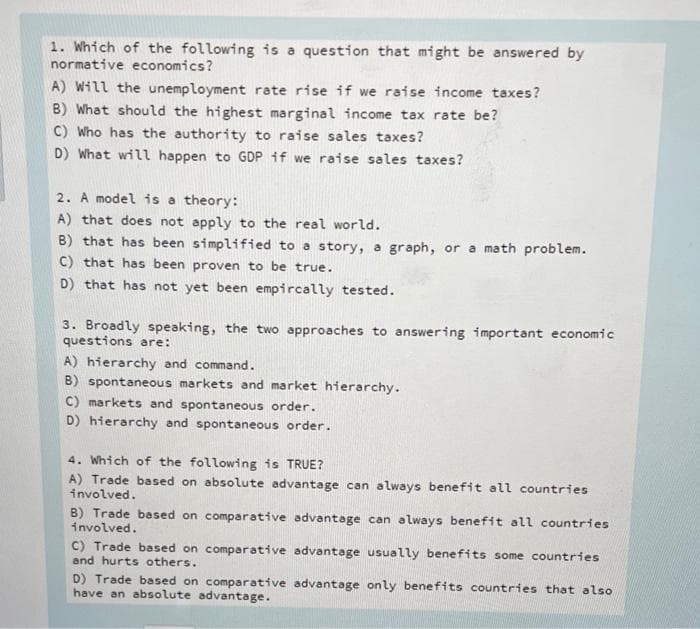1. Which of the following is a question that might be answered by normative economics? A) WHLl the unemployment rate rise if we raise income taxes? B) What should the highest marginal income tax rate be? C) Who has the authority to raise sales taxes? D) What will happen to GDP if we raise sales taxes?
1. Which of the following is a question that might be answered by normative economics? A) WHLl the unemployment rate rise if we raise income taxes? B) What should the highest marginal income tax rate be? C) Who has the authority to raise sales taxes? D) What will happen to GDP if we raise sales taxes?
Brief Principles of Macroeconomics (MindTap Course List)
8th Edition
ISBN:9781337091985
Author:N. Gregory Mankiw
Publisher:N. Gregory Mankiw
Chapter2: Thinking Like An Economist
Section: Chapter Questions
Problem 9QR
Related questions
Question
10

Transcribed Image Text:1. Which of the following is a question that might be answered by
normative economics?
A) Will the unemployment rate rise if we raise income taxes?
B) What should the highest marginal income tax rate be?
C) Who has the authority to raise sales taxes?
D) What will happen to GDP if we raise sales taxes?
2. A model is a theory:
A) that does not apply to the real world.
B) that has been simplified to a story, a graph, or a math problem.
C) that has been proven to be true.
D) that has not yet been empircally tested.
3. Broadly speaking, the two approaches to answering important economic
questions are:
A) hierarchy and command.
B) spontaneous markets and market hierarchy.
C) markets and spontaneous order.
D) hierarchy and spontaneous order.
4. Which of the following is TRUE?
A) Trade based on absolute advantage can always benefit all countries
involved.
B) Trade based on comparative advantage can always benefit all countries
involved.
C) Trade based on comparative advantage usually benefits some countries
and hurts others.
D) Trade based on comparative advantage only benefits countries that also
have an absolute advantage.
Expert Solution
This question has been solved!
Explore an expertly crafted, step-by-step solution for a thorough understanding of key concepts.
This is a popular solution!
Trending now
This is a popular solution!
Step by step
Solved in 2 steps

Recommended textbooks for you

Brief Principles of Macroeconomics (MindTap Cours…
Economics
ISBN:
9781337091985
Author:
N. Gregory Mankiw
Publisher:
Cengage Learning

Essentials of Economics (MindTap Course List)
Economics
ISBN:
9781337091992
Author:
N. Gregory Mankiw
Publisher:
Cengage Learning

Brief Principles of Macroeconomics (MindTap Cours…
Economics
ISBN:
9781337091985
Author:
N. Gregory Mankiw
Publisher:
Cengage Learning

Essentials of Economics (MindTap Course List)
Economics
ISBN:
9781337091992
Author:
N. Gregory Mankiw
Publisher:
Cengage Learning